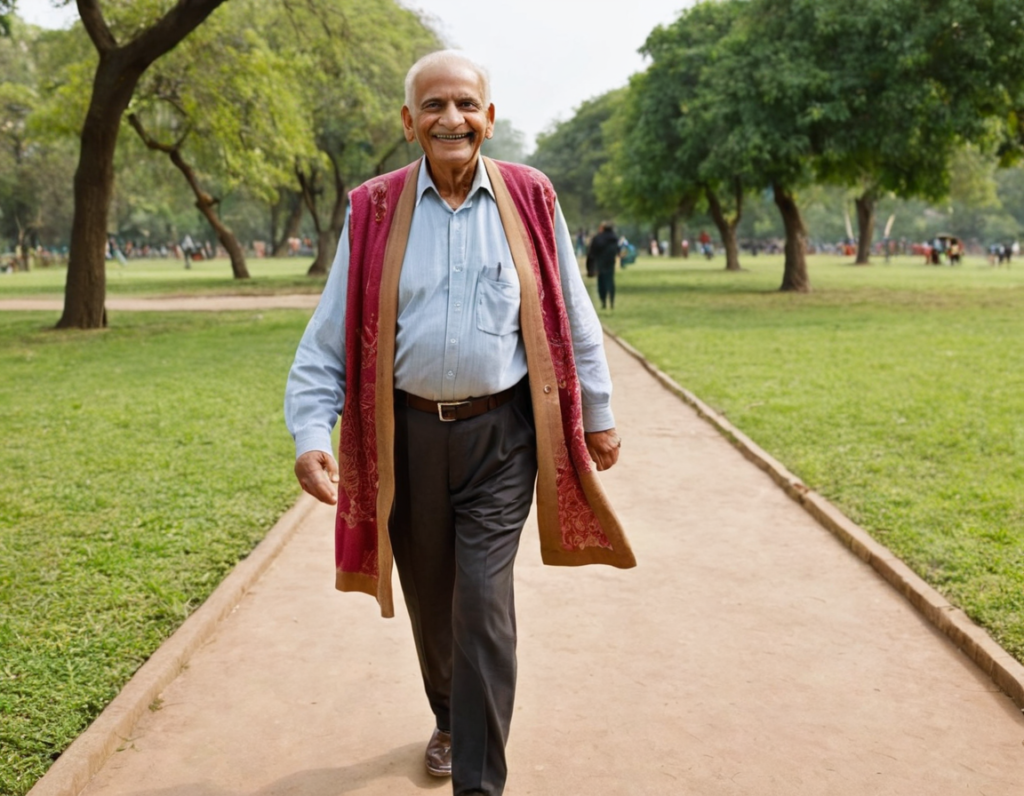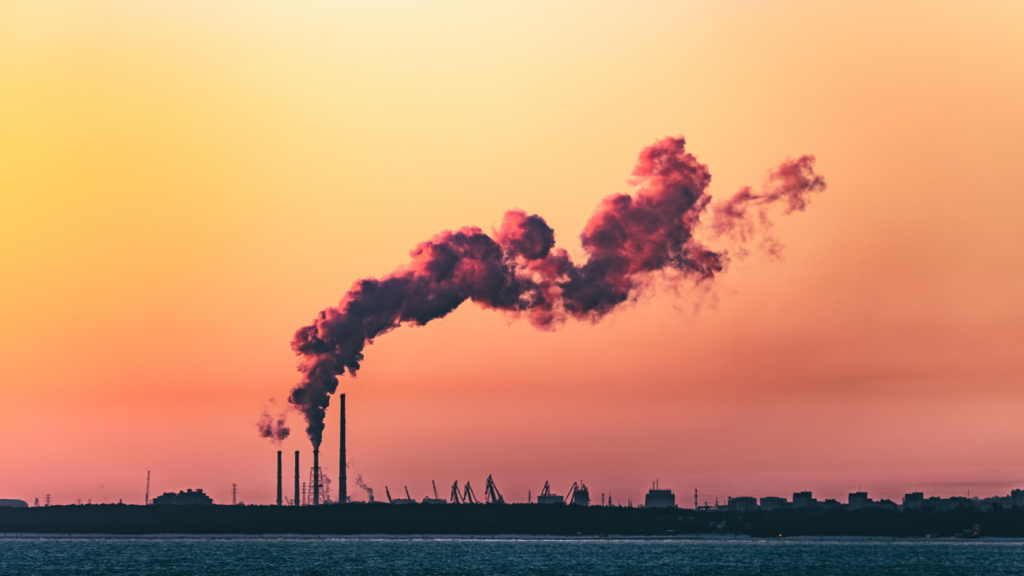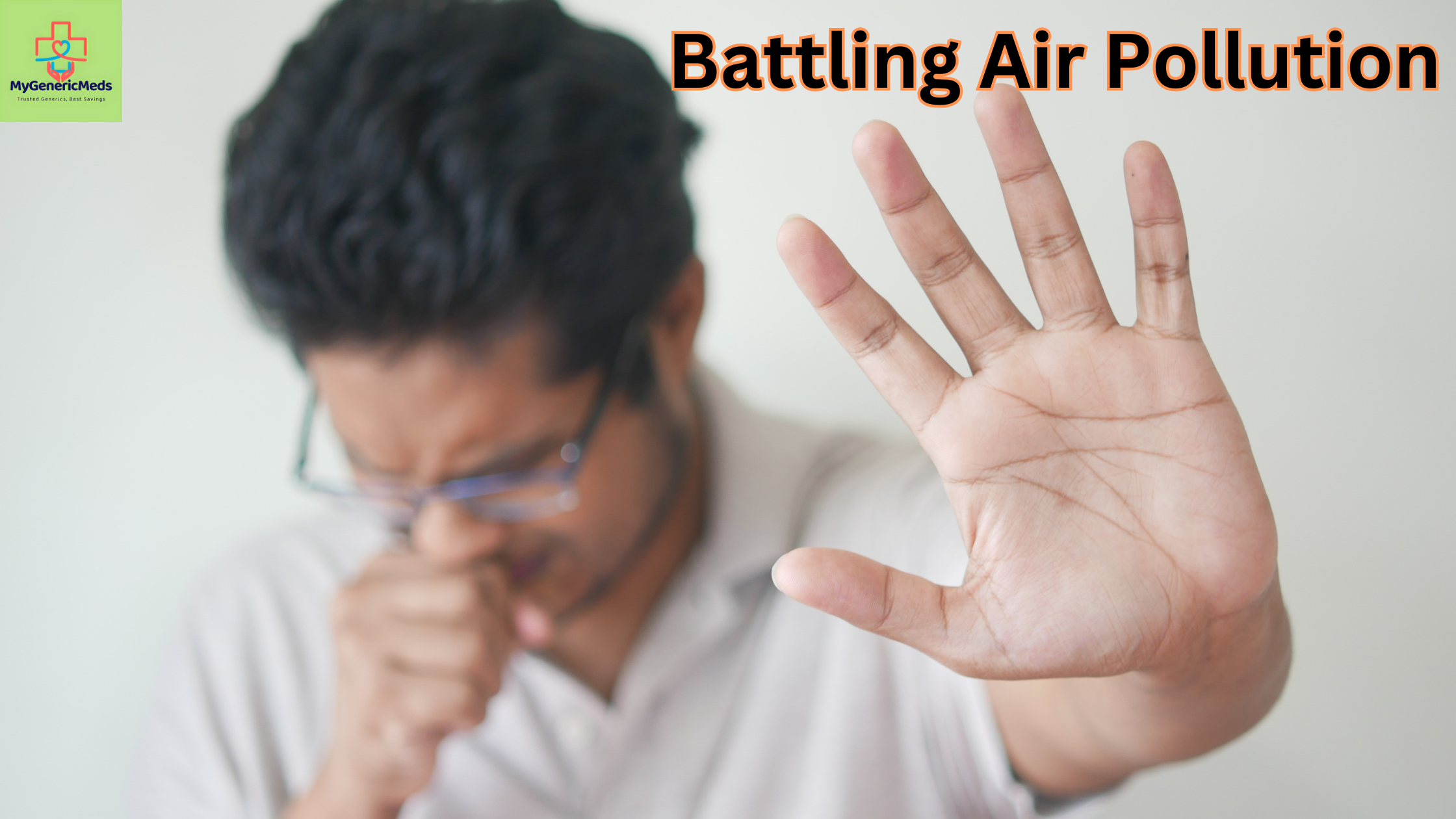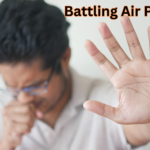Table of Contents
ToggleIntroduction
The air we breathe in many Indian cities is far from pure. From hazy skylines to irritating smoggy days, air pollution is a tangible threat to our well-being, especially our respiratory health. India consistently features in lists of countries with the poorest air quality, a situation that demands not just awareness but urgent action on both individual and community levels. This blog post aims to arm you with knowledge about air pollution in India, its health impacts, and crucially, how you can protect your lungs and breathe a little easier.
Understanding Air Pollution in India
What is air pollution?
Air pollution is a complex mixture of tiny particles and harmful gases in the air. The most concerning pollutants when it comes to our health are:
- Particulate Matter (PM): Microscopic particles categorized as PM10 (less than 10 micrometers in diameter) and the even finer PM2.5 (less than 2.5 micrometers). These can penetrate deep into the lungs and cause significant damage.
- Other pollutants: Nitrogen dioxide (NO2), sulfur dioxide (SO2), ozone (O3), and carbon monoxide (CO) are also harmful air pollutants.
What are the sources?
Air pollution in India stems from a mix of sources:
- Industry: Emissions from factories, power plants, and other industries.
- Vehicles: Cars, trucks, and buses release exhaust fumes loaded with pollutants.
- Construction: Dust from construction sites adds to particulate matter in the air.
- Crop burning: A seasonal issue, particularly in north India, where farmers burn agricultural residue.
- Household sources: Burning of solid fuels (wood, coal) for cooking, incense, etc., contribute to indoor air pollution.
How is air quality measured?
The Air Quality Index (AQI) is a tool to communicate how polluted the air is at a given time. It’s calculated based on the levels of major pollutants and assigned a number and category:
- 0-50: Good
- 51-100: Satisfactory
- 101-200: Moderate
- 201-300: Poor
- 301-400: Very Poor
- 401-500: Severe
Which Indian cities have the worst air quality?
Sadly, several Indian metropolises regularly feature among the world’s most polluted cities. Delhi, Mumbai, Kolkata, and others often experience “Very Poor” or “Severe” AQI levels, especially during winter months and festival periods.
How Air Pollution Harms Your Respiratory Health
Our lungs are designed to inhale clean air, but the polluted air in many Indian cities acts as a constant irritant and stressor for our respiratory system. The effects of air pollution can be both short-term and long-term:
Short-term effects:
- Irritation: Eyes, nose, and throat may feel itchy and inflamed.
- Coughing and wheezing: Pollutants irritate the airways, leading to coughing or a whistling sound while breathing.
- Breathing difficulties: Shortness of breath, tightness in the chest.
- Asthma attacks: Air pollution is a major trigger for asthma attacks, worsening symptoms in those with the condition.
- Worsening of allergies: Air pollution can exacerbate allergies like hay fever or allergic rhinitis.
- Increased risk of respiratory infections: Pollutants can weaken the defense mechanisms in your airways, making you more susceptible to colds, pneumonia, etc.
Long-term effects:
- Chronic Obstructive Pulmonary Disease (COPD): A group of diseases (like bronchitis, emphysema) that cause airflow blockage and breathing-related problems.
- Lung cancer: Prolonged exposure to specific air pollutants raises the risk of lung cancer.
- Cardiovascular problems: Air pollution is linked to increased risk of heart disease, stroke, and heart attacks.
- Reduced lung function: Long-term exposure can lead to a decline in overall lung capacity.
- Weakened immune system: Makes the body more vulnerable to various illnesses.
Who’s most vulnerable?
While air pollution affects everyone, certain groups are at a higher risk:
- Children: Their lungs are still developing, making them more susceptible to damage.
- Elderly: The body’s defenses weaken with age, increasing the impact of pollution.
- People with pre-existing conditions: Those with asthma, COPD, heart disease, or allergies.
- Outdoor workers: People whose jobs involve prolonged outdoor exposure, such as traffic police, construction workers, etc.
It’s crucial to note that even seemingly ‘healthy’ individuals can experience negative health consequences from persistent exposure to air pollution.

Buy Branded Medicines related to Lung Care here
Who's most vulnerable?
While air pollution affects everyone, certain groups are at a higher risk:
- Children: Their lungs are still developing, making them more susceptible to the harmful effects of pollutants. Air pollution can stunt lung growth and increase the risk of respiratory infections in childhood, which can have lifelong impacts.
- Elderly: As we age, our body’s defenses naturally weaken, making us more vulnerable to pollution’s impact. The elderly may experience worsened symptoms of existing health conditions and a higher risk of premature mortality related to air pollution exposure.
- People with pre-existing conditions: Those with asthma, COPD, heart disease, or allergies are particularly sensitive to air pollution. Pollution can trigger flare-ups of their conditions, leading to hospitalizations and a decreased quality of life.
- Outdoor workers: People whose jobs involve prolonged outdoor exposure, such as traffic police, construction workers, street vendors, and farmers, face higher levels of pollution on a daily basis. This puts them at greater risk of both short-term and long-term health problems.
- Those living in highly polluted areas: Understandably, residents of cities or neighborhoods with consistently poor air quality, often located near industrial zones or with heavy traffic, bear a greater burden of the health risks associated with air pollution.
Important Note: Even seemingly ‘healthy’ individuals can experience negative health consequences from persistent exposure to air pollution. Research suggests that long-term exposure can contribute to the development of chronic conditions even in those with no prior respiratory issues. This emphasizes that protecting ourselves from air pollution is a concern for everyone.
Protecting Yourself From Air Pollution: Essential Tips
While tackling air pollution requires policy changes and systemic shifts, there’s much we can do as individuals to minimize the impact on our health. Here’s your toolkit:
- Check the AQI: Make it a habit to check the Air Quality Index (AQI) for your city before you step out. Several resources provide this information:
- Government websites: The Central Pollution Control Board ([CPCB website] (https://app.cpcbccr.com/AQI_India/)) offers real-time AQI data.
- Weather apps: Most weather apps now incorporate AQI information.
- Dedicated air quality apps: There are apps specifically designed for air quality monitoring.
- Masks Matter: When the AQI indicates moderate to severe pollution levels, wearing a mask is crucial.
- N95/N99 masks: These masks offer the best protection by filtering out a high percentage of PM2.5 particles. Look for certification on the mask packaging.
- Cloth masks: While less effective than respirator masks, they still offer some protection against larger particles. Choose ones with multiple layers and a good fit.
- Timing your outdoors: Whenever possible, plan outdoor activities for times when pollution levels are typically lower. This is often in the early mornings or late evenings. Avoid prolonged exertion outdoors on days with bad AQIs.
- Indoor air quality: Don’t assume you’re safe indoors! Take steps to improve indoor air quality:
- Air purifiers: Invest in air purifiers with HEPA filters, especially if you live in a highly polluted area.
- Ventilation: Open windows for ventilation when the outdoor air quality is good.
- Reduce indoor sources of pollution: Avoid burning incense sticks or candles. If cooking with solid fuels, ensure proper ventilation.
- The Green Help: Houseplants can play a small but helpful role in filtering indoor air. Choose plants known for their air-purifying properties, such as:
- Spider Plant
- Snake Plant
- Peace Lily
- Areca Palm
- Diet and immunity: A healthy diet rich in antioxidants helps your body fight the harmful effects of pollution. Include plenty of:
- Fruits and vegetables: Rich in Vitamin C, Vitamin E, and other antioxidants.
- Omega-3 fatty acids: Found in oily fish, flaxseeds, etc., have anti-inflammatory effects. One can have excellent Multi Vitamin Supplements like AV Salute Capsules
- Nuts and seeds: Good sources of Vitamin E.
You can get High quality, Branded Multivitamins at lowest prices at My Generic Meds. Order now!!
- Staying informed and engaged: Combating air pollution requires action on multiple levels. Stay informed and lend your voice to the cause:
- News and alerts: Subscribe to air quality alerts for your city. Stay aware of news broadcasts about pollution episodes, so you can take extra precautions as needed.
- Follow environmental groups: Reputable organizations working on air quality issues often provide valuable information, updates on regulations, and calls to action.
- Get involved: Support community initiatives for cleaner air. Participate in awareness campaigns, write to your local representatives, and advocate for policies that prioritize public health.
Important to remember: While individual actions make a difference in protecting our own health, addressing the air pollution crisis at its root will require systemic changes. By being informed and engaged citizens, we can influence these changes for cleaner air and a healthier future.
Beyond Individual Action: Addressing Air Pollution at a Larger Scale
While it’s essential to take steps to protect ourselves from the immediate risks of air pollution, the fight for clean air demands action on a societal level. This involves:
- The role of government policies: Governments play a crucial role in setting and enforcing regulations to prevent and reduce air pollution. Key policy interventions include:
- Stricter emission standards: Implementing stringent standards for vehicles, industries, and power plants to reduce harmful emissions.
- Promoting clean energy: Shifting away from fossil fuels towards renewable energy sources like solar and wind power.
- Investing in public transportation: Developing efficient, accessible, and affordable public transport systems to reduce reliance on private vehicles.
- Urban planning: Designing cities with green spaces, pedestrian-friendly zones, and measures to reduce traffic congestion.
- Community action: Grassroots initiatives and community organizations are powerful forces in driving awareness and demanding cleaner air.
- Advocacy groups: Organizations focused on air pollution work to educate the public, monitor pollution levels, and put pressure on policymakers.
- Awareness campaigns: Spreading information about the health impacts of air pollution and solutions through marches, workshops, and other outreach activities.
- Citizen monitoring: Participatory initiatives to collect local air quality data and hold industries or authorities accountable for pollution hotspots.
- Lifestyle changes: Making conscious choices for cleaner air
While we need strong policies and industry-level transformations, individual choices, when multiplied across a population, can collectively make a significant difference. Here’s how your lifestyle choices matter:
- Prioritizing public transport, carpooling, and cycling: Whenever feasible, choose public transport, carpool, or opt for cycling or walking for shorter distances. Reducing the number of private vehicles on the road is crucial for better air quality in cities.
- Energy conservation at home: From switching to energy-efficient appliances to reducing unnecessary electricity usage, small steps in your household can contribute to lowering the overall demand for energy, much of which is still generated from polluting sources.
- Sustainable consumption and waste reduction: Be mindful of the environmental impact of your purchases. Support businesses committed to sustainable practices, choose products with less packaging, and prioritize repairing and reusing over discarding.
- Reducing reliance on burning: Whether it’s solid fuels for cooking in some households or burning of agricultural waste, finding cleaner alternatives is important. Support the transition to cleaner cooking fuels where possible, and advocate for policies that address crop burning practices.
- Spreading awareness: Talk to your friends, family, colleagues, and neighbors about the importance of air quality. Encourage them to adopt practices that reduce emissions and create a demand for environmentally conscious choices.
The power of collective action: Remember, even seemingly small changes in your lifestyle, when adopted by a large number of people, contribute to a cumulative positive impact. These choices, combined with advocacy for policy changes, demonstrate a demand for cleaner air and influence the decisions of businesses and policymakers.

Conclusion: A Breath of Fresh Air – Our Collective Responsibility
The fight against air pollution is not just about the facts and figures – it’s about our right to breathe clean air, to live healthier lives, and to leave a sustainable planet for future generations. While the problem may seem overwhelming, remember that change is possible.
Here’s a recap of the key takeaways:
- Understanding the problem: Being aware of the sources of air pollution, its health impacts, and who’s most affected is the first step towards action.
- Individual actions matter: From checking the AQI to choosing a high-quality mask, and prioritizing cleaner modes of transport, our daily choices add up.
- The need for systemic change: Supporting policy changes, community initiatives, and demanding accountability from industries and governments is essential for addressing the root causes of air pollution.
- The power of awareness: Spread the word and encourage those in your circle to adopt practices that prioritize air quality.
The challenge of air pollution in Indian cities is significant, but not insurmountable. It requires a combination of individual responsibility, concerted community action, and strong policy interventions. Let’s commit to doing our part to ensure cleaner air for ourselves and generations to come.
Call to Action
Here are a few actions you can take right now:
- Share this blog post: Help raise awareness about the dangers of air pollution and solutions
- Sign up for air quality alerts: Stay informed about pollution levels in your area.
- Support an environmental group: Get involved with an organization working for clean air.
A Note of Hope
Progress is possible when we work together. Cities around the world have shown that with concerted efforts, air quality can be improved. Let’s demand that commitment to clean air from our policymakers and leaders, and let’s hold ourselves accountable to choices that help us all breathe a little easier.






